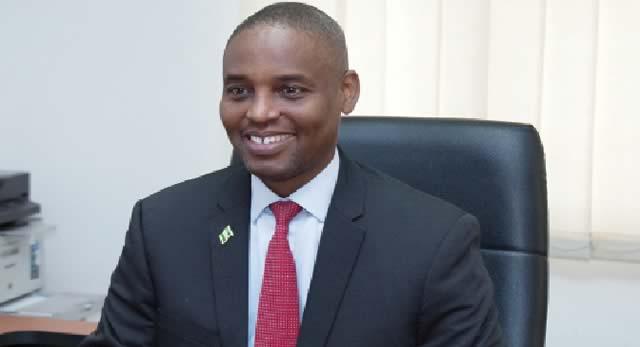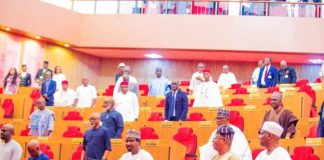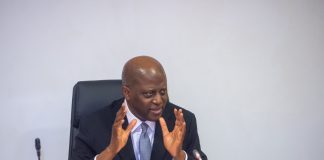🌿 Ruzu Non-Alcoholic Herbal Bitters
Ruzu Non-Alcoholic Herbal Bitters is a natural health supplement specially formulated to:
- ✅ Promote general wellness
- ✅ Detoxify the body
- ✅ Support the treatment of various ailments
Made from a powerful blend of 100% organic and medicinal herbs, Ruzu is completely alcohol-free, making it ideal for:
- 👪 All age groups
- 🌱 Health-conscious individuals
- 🌿 Anyone seeking non-alcoholic herbal remedies
Whether you're looking to boost your vitality, cleanse your system, or support healing the natural way, Ruzu Bitters offers a trusted herbal solution.
Aero Contractors’ managing director, Capt. Ado Sanusi, discusses his goals for the airline and the repayment of debts he has taken out from the Asset Management Corporation of Nigeria (AMCON) since 2017. Extracts:
Asset Management Corporation of Nigeria (AMCON) granted you some startup loans when you were appointed CEO of Aero Contractors, sir. How far along are you with loan repayment?
Aero Contractors was placed under receivership by the Asset Management Corporation of Nigeria (AMCON) due to a debt. The corporation took over the company, converted a portion of the debt into equity, and now owned 60% of the airline. However, the airline had been closed for almost eight or ten months when I arrived in 2017, and I had to take out a loan in order to restart the airline.
I am unable to recall the precise amount, but I believe it to be around N300 million, or half a billion naira.
When we first joined the company, we requested roughly N3.5 billion from the Asset Management Corporation of Nigeria (AMCON), but we never received it.
About N500 million was authorized by AMCON for our launch. We used the funds, which were provided in installments, to stabilize the company.
When we conducted the first C-check, four of our fleet’s aircraft and helicopters were in flight for the first time. Recuperation seemed imminent, and everything was moving in the right way.
Following that, I was transferred to a different project; regrettably, the company’s fortunes plummeted once more, and it was shut down.
After finishing that assignment, I was requested to come and help restart the business, but I didn’t want to go back.
In fact, I rebuffed their advances for around six months, but in my final discussion with AMCON management, they said, “Well, if you don’t, we will have no option, but to liquidate.”
Aero Contractors, an aviation company that has been liquidated for more than 65 years, left a legacy that I didn’t want to see.
You know, at conferences, nations would come out and say things like, “Oh, this company has been in existence for 40 years.” Over fifty years have passed since the founding of our organization.
“Oh, we’ve been in business for more than 70 years,” says Ethiopian Airlines. “Then Nigeria comes along, and we won’t have any companies that have been in business for more than 40 or 50 years.”
I believed that we should at least preserve this company’s legacy. I believe that Aero Contractors and Dornier Aviation in Kaduna are the two oldest aviation firms in Nigeria. The reason for this is, of course, that Nigeria Airways has been liquidated. These businesses are old, and I agreed to step in because I believed that we shouldn’t let AMCON liquidate the airline.
Against my will, I returned, but I did. As I mentioned earlier, the business was closed for almost eight months. Their paychecks and other obligations were due.
If you recall, the initial reason for my return was the COVID-19 epidemic.
At a single-digit interest rate, I stated that the Federal Government had approved funds for all airlines. The only reason I can return after COVID is if I can get that loan, I remarked. And I recall that we were requesting a loan of roughly N3.5 to N3.7 billion in order to revitalize the business and repay the loan in 12 or 24 months.
We demonstrated that, if granted the loan, we could repay it. In theory, they therefore consented to lend us the money.
Eventually, AMCON granted us another loan, which initially, I believe, was somewhat more than N500 million. We began working, of course, and later brought the first airplane, the helicopter industry, and everything else back to life.
Then we began to pay them. I’m pleased to report that we have now paid everything back.
What is the duration of the loan repayment period?
Around December 2022, we received the loan, and by March, we had paid it off in full.
Do you think this company will continue to exist after you leave, sir?
This is a really intriguing topic since, after joining the company in 2017, I believed I had moved it to a point where it could no longer return to the closed-down state. Regretfully, it happened. I was living in 2021 at the time.
My challenge as we speak now is to make sure that we have passed that stage. I am not creating an institution around myself; rather, I am creating an institution that will endure long after I am gone.
My objective is to make sure the business can survive after I go. Additionally, that is the only legacy I can leave.
Right now, my only goal is to leave a legacy that will allow the business to prosper after I’m gone, continue to hire Nigerians, and continue to hire young people to work in our Maintenance, Repair, and Overhaul (MRO) facilities, which are among the best in West and Central Africa.
The resuscitation of our MRO makes me very glad. Right now, we are able to perform heavy checks and repairs on Boeing 737NG aircraft.
We recently completed two aircraft projects: one from Ghana and one from Senegal. In the future, I hope that this location will serve as a maintenance hub for West and Central Africa.
You recently signed the new Tax Reform Act into law, and it is expected to go into effect in 2026. What do you think of this?
I’d like to bring up the aviation sector that I represent. Because of the difficulties facing Nigeria’s aviation sector, we approached the Federal Government prior to the enactment of the tax reform bill.
Among other things, we have requested several exemptions from customs taxes and the Value Added Tax (VAT).
Understanding the difficulties facing the aviation sector, the Federal Government approved the majority of our petitions before returning everything to us.
We are now responsible for paying for everything after all of the privileges that we received were taken away. Indeed, I think it is tax reform; however, I also think that the President and the Federal Government will examine the particular industry and its unique issues and take appropriate action. It will, I think. The occurrence of it won’t be entirely random.
Most of the world’s transportation is already VAT-free, but how can we make aviation subject to VAT again? However, when we say, “Well, the VAT is for the government, so the passenger is paying, but it raises the price of the ticket,” the number of people who can purchase the ticket decreases, and when fewer people will purchase the ticket, my ability to make a profit is diminished. It’s that easy.
Apart from the food given in the airplane, keep in mind that we in this country do not manufacture anything related to aircraft. As a result of Alhaji Aliko Dangote, Jet A1 is being made domestically. Except for that, everything was imported prior to that time.
It’s true that the government may make a lot of money by taxing the airlines because they cost $30 million to $40 million. Even a 10% tax can be calculated to see how much money is raised.
My task is to figure out how to pay for the aircraft, including the customs duty that was applied to it.
Even with a dry lease, I now find it extremely difficult to make the payment.
Indeed, customs makes trillions of naira for the federal government, but it also kills enterprises, particularly in the aviation industry.
Read Also: Obi to Tinubu: Your Administration Is Building Unsustainable Debt With No Tangible Results
The new law will cause social problems and thousands, if not millions, of job losses if it is implemented as is. Indeed, there will be security issues, but the government will also be wealthy.
While you have trillions in your coffers, millions of young people remain unemployed.
Because of this, industrialized nations try to balance the two by examining both the unemployment rate and revenue creation. With millions of young people without jobs, you cannot have that much money in your coffers. Allowing the firm to flourish and hire staff is essential. It is what we are requesting.
Before the implementation starts in January 2026, what actions have you made to communicate your stance to the government?
This interview, I think, will allow the Federal Government to hear our grievances and take the necessary action.
Other information is not required of them. The stakeholders, including the airlines, are being informed that this will negatively impact our sector.
Some issues will arise for the parastatals as a result of the tax change. I’m not sure whether what I’ve read is accurate, but it seems to indicate that the agencies have no control over their Internally Generated Revenues (IGRs). If the agencies lack authority over their IGRs, it simply means that the funds paid by the airlines would be sent straight to the Federal Government’s account, which would then return the funds to the agencies.
As you may recall, at the start of this administration, the government withheld half of the agency revenues into the Treasury Single Account (TSAs). These parastatals are based on the principle of cost recovery rather than profit.
Therefore, I don’t mind if the Federal Government decides to turn the Nigeria Civil Aviation Authority (NCAA) into a business in order to make money, but I’m worried about the NCAA and the Nigerian Airspace Management Agency (NAMA), whose concept is for cost recovery, and you cut half of their revenue. They cannot survive on 50%, thus if they are adhering to the cost recovery approach, they will inevitably fail.
That implies that if the parastatals are making 50% of their produced revenue, then I, as an airline operator, have been overpaid. I’ve been overcharged, then.
In your opinion, does the government’s claim that the Tax Reform Act aims to lessen systemic corruption hold water?
Absolutely, I also believe that. If we Nigerians find an issue with remittance or collection, we will assign the duty to another organization.
What guarantees do we have that the corruption won’t spread to that other location? How about we deal with the corruption within that agency? Let’s deal with the issue where it is. If the issue is that the parastatals are collecting but not remitting, why don’t you take care of that and make sure we use all available tools to modernize, digitize, or electronically process it? There are several things we can take to minimize corruption and limit human interaction.
But instead, we say, “Oh, stop it.” If we catch someone, we set an example for others, and they will follow suit. Refrain from collecting it, doing this, and doing this.
This has probably resulted in the transmission of the same issue to the next agency that will be handling the same problem as them. The tax reform is undoubtedly intended to reduce corruption and boost efficiency and revenue collection, but if we don’t deal with the problems at the outset and don’t use technology to reduce corruption, we’ll likely find ourselves in a same situation under a different name.
Are airlines going to be killed by the Tax Reform Act?
If the Tax Reform Act fails to address the unique issues in the aviation business, it will contribute to the acceleration of the demise of several carriers.
















